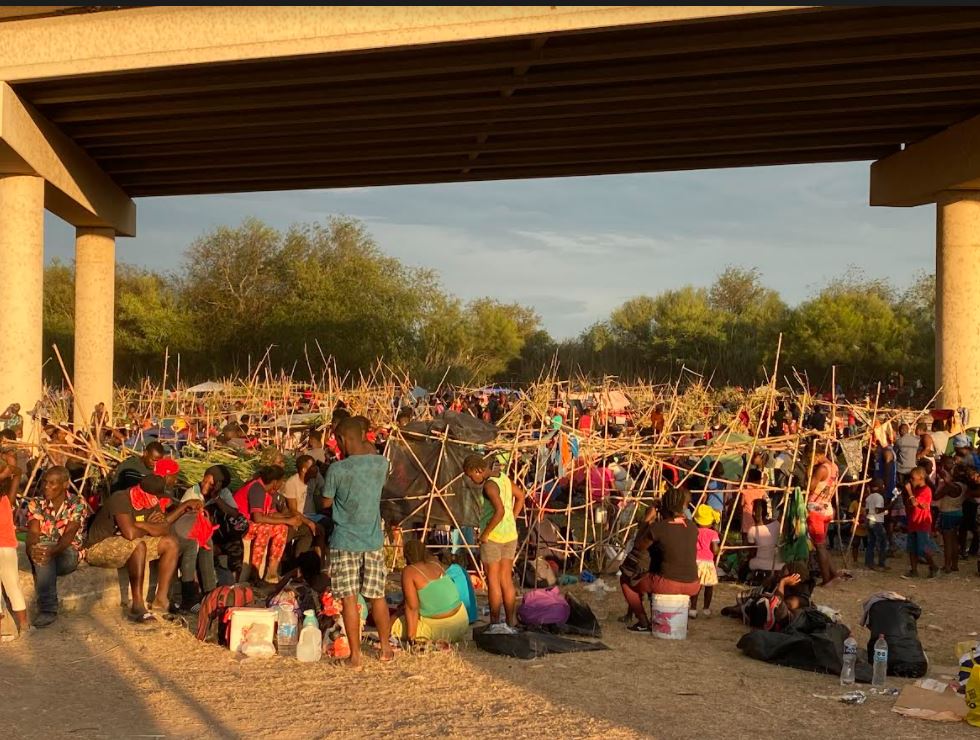How the president helped launch a thousand ships toward Florida

By Todd Bensman as published March 14, 2024 by The American Mind magazine

aiti has now entered a metaphorical Hall of Failed States, where it can be alphabetically exhibited between Congo and Libya. Now, a Florida Keys-bound refugee flotilla of rickety sail boats—ever the irresistible love object of news video cameras—is taking form as a kind of torpedo heading at President Joe Biden’s November re-election ambitions.
But whether the administration heads off the ships at sea or lets thousands of Haitian immigrants mar the waterfront views of wealthy Floridian vacation homeowners, most Americans should know the bitterly ironic backstory of how Biden himself essentially ordered up Haiti’s current post-apocalyptic fate and now stands to reap what he sowed politically.
Haiti’s deep underlying problems certainly long predate Biden’s presidency. But he was the one who signed, sealed, and delivered the Haitian state’s final execution orders. More specifically, as reporting in my 2023 book Overrun reveals, he did it in the months of September and October 2021, when 15,000 Haitians suddenly showed up in Del Rio, Texas, as a major political problem for Democrats ahead of the 2022 U.S. midterm elections.
The Haitians formed a vast, fetid encampment that third week of September—the largest of its kind in U.S. history—and drew intense international media attention. The White House decided it had to be shut down amid fear that rapid camp growth would spark wild break-out melees into Texas, on camera, ahead of the elections, according to later reporting by the New York Times, Wall Street Journal, and Washington Post.
Biden’s administration decided on a solution that struck border-hating White House advisers as downright Trumpian-medieval: Immigration and Customs Enforcement (ICE) air deportations for thousands of the camp’s Haitians, all the way back to Port-au-Prince—a powerful disincentive for every Haitian to remain encamped in Texas.
But to carry out air deportations from the nearby Laughlin Air Force base near Del Rio, the administration first needed the approval and security cooperation on the ground from Haiti’s provisional president, Dr. Ariel Henry, who had just taken over in the wake of the August 2021 assassination of President Joevenal Moise.
That assassination, and then the U.S. decision to start deportations in September, would prove disastrous for Haiti’s long-term future and for what all can see now in the horrible headlines about the Caribbean island country of 11 million.
At that very moment in September 2021, Haiti was just two months away from planned national elections, both parliamentary and presidential. A first round of national elections was set for November 7, 2021, along with a constitutional referendum that might finally put Haiti on the road to self-governance after years of devastating hurricanes, earthquakes, and political disorder.
International organizations and the United States had been planning these elections for years. Haiti’s “Provisional Electoral Council” was intended as the crucial first step necessary to finally set Haiti up for a shot at long-term stability, security, and accountable governance.
But it wasn’t to be.
The Biden Administration, through its State Department, installed Henry as Haiti’s de facto dictator and then let Henry cancel those elections in exchange for accepting air deportations from Texas.
This is according to the Biden-appointed former U.S. Special Envoy to Haiti, Ambassador Daniel Foote, who first relayed the surprising backstory to me in an interview for my book many months afterward:
I am confident that the chief reason they did that is [Henry’s] malleability and the fact that he agreed that he would take all the deportees that they wanted to send,” Foote told me. “It wasn’t long after that…we started putting them on planes.
The U.S. carried out a non-democratic transfer of power. We were just kicking the can down the road so that we don’t upset the vote moving toward the mid-terms.
In lieu of elections, the first of what would be 58 flights from the Del Rio camp carrying nearly 9,000 Haitians from Texas started landing in Port-au-Prince on about September 20. On September 27, Henry abolished the Provisional Electoral Council.
He could not have done such a thing without American backing, which effectively anointed Henry to indefinite power with no pressure to restore the elections, said Foote. Senior State Department officials told him they did not want his input, because the decision was already made.
A Direful Spectacle of Wreck
Biden’s own brand-new envoy was so outraged by the abandoned election that he resigned just weeks into the job, a move that was widely misreported as outrage over the mistreatment of Haitians in Del Rio.
“The biggest reason” he resigned, Foote told me for Overrun, was that the Biden government anointed Henry to power and never demanded that he conduct the democracy-restoration project, all for short-term political gain in the American midterm election.
“I believe they were terrified of immigration as an issue in the mid-terms and beyond,” Foote told me.
None of that was reported in America’s popular press then. It certainly does not feature now, in the midst of Haiti’s collapse.
But in a more recent interview with me, Foote still squarely places blame for Haiti’s implosion on what the Biden Administration did then to liquidate the Del Rio migrant camp.
“If you were to assign blame for the current situation in Haiti, I believe the Biden administration deserves 80% of the blame for where Haiti is now,” he said to me in a phone interview. “They chose Henry but didn’t hold his feet to the fire for what he said he was going to do [to hold national elections]. He never did anything. He just put up obstacles to any political accord.
“They completely created this crisis with the gangs.”
The Biden Administration never cared about pressing for Haitian elections, Foote continued, only that it could “maintain the ability to keep sending desperate Haitians back to a failed state, and that Henry was compliant in receiving deportees.”
The administration’s 2021 scheme worked politically for the Democrats in the short term. Ten days after it formed, the Del Rio camp was gone, thousands of the Haitians in it having been shipped back to Haiti in ICE Air flights and the rest fleeing back into Mexico to escape that highly feared outcome, as I reported on the ground at the time.
The Democrats fared much better in the 2022 midterms than was predicted—but at a terrible cost for Haiti, which spiraled. The all-important elections never got rescheduled, or even seriously discussed again. Henry remained Haiti’s U.S.-backed chief of state and continued taking U.S. air deportees for a long time, as the Biden Administration sought to prevent any similar Del Rio-type crisis from ever happening again.
Haiti’s bicameral National Assembly legislature, which is supposed to provide ratifying checks or balances on executive branch power, and the country’s Supreme Court, remained defunct, according to the CIA’s World Fact Book.
The tiny few familiar with what the Biden Administration did to Haiti, like Foote, knew the country’s collapse was only a matter of time without the elections.
Now, Haiti—and soon the administration, and the United States at large—will feel the consequences in other ways. The gangs deposed Henry, who has taken refuge in Puerto Rico, and warn they will kill him if he returns.
There are no U.S. air deportations going on now, because those armed criminal gangs ransacked the country’s airports and seaports.
Biden may have escaped all blame for what he inflicted on Haiti. But in a sort of grim twist, he will face potential repercussions for it in the coming November election.
A flotilla of Haitians on all manner of boats is starting to gather in larger numbers, heading for Florida.
Election issue polling shows that illegal immigration over the southern border, a historic crisis now in its fourth year, is the apex negative issue for Biden going into the November election. Flotillas of desperate Haitians hitting American shores could only exacerbate that problem.
A U.S. Border Patrol station in the string of islands known as the Florida Keys is reportedly warning that it is unprepared and will be quickly overwhelmed if their bosses in Washington allow any to land. Gov. Ron DeSantis has ordered 250 officers and soldiers with sea craft and other state assets to confront a potential crisis.
Whether the Biden government orders interdicted repatriations at sea, or rewarding welcomes in Florida, is the inflection point test to watch. Biden seems to understand this and has ordered preparations to put Haitian boat people on the U.S. military base at Guantanamo Bay, Cuba.
And now the Biden Administration sees fit to call for elections. Secretary of State Antony Blinken is suddenly proposing a “Multinational Security Support” mission that would “steer the country toward…free and fair elections.”
No one in the administration is accepting any blame for what happened, and no one in the U.S. or foreign media is assigning it. That is far too little and way too late for Haiti. And—depending on what happens with the Florida-bound boat exodus—maybe for Biden, too.